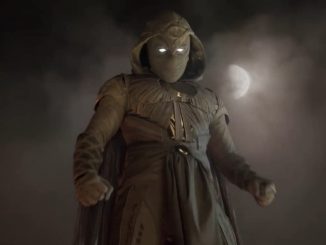
M. Night Shyamalan’s Knock at the Cabin is an underwhelming home-invasion film which does nothing special and provides no surprises.
The film follows married couple Eric (Johnathan Groff) and Andrew (Ben Aldridge) and their daughter Wen (Kristen Cui) on their family holiday to a remote cabin. During their stay, the family are taken hostage by four armed strangers demanding that they make some impossible decisions to prevent the apocalypse from happening. With limited access to the outside world, the three must decide what they believe to be real.
With a remote location, well-rounded antagonists and a family held hostage, this film had the moving parts to make something great, but failed to put them together in an engaging way. The repetitive storytelling prevents this so-called horror movie from building tension. As our invaders lay out their intentions so early in the movie, the audience knows exactly what to expect and what’s worse, we were right.
Wielding their DIY weapons, there was real potential for some interesting kills. Instead, the characters stick to the prescribed formula, robbing us of any real suspense. The characters are interesting enough, each with a satisfying backstory and qualities which set them apart in small ways.
The merits lie solely in the acting and camera work. Dave Bautista gives a great performance as Leonard, the leader of the pack and Abby Quinn plays a strung-out Adriane so well it’s irritating. Paired with some interesting camera work, there’s just enough to keep you in your seat.
Unnecessary details are woven throughout the story, while some integral details are thrown in too close to the end. A particular revelation made by Groff’s character is disclosed too late in the game to be of any interest or value.
The pacing gives CPR to a middling story. Coming in at just 100 mins, Shyamalan makes his point and makes it quickly. The movie’s tight storytelling of this lacklustre tale is the only thing saving the audience from checking their watches.
The greatest sin in all the mediocrity is Shyamalan’s lack of faith in his audience to follow an all too simple narrative, as a character directly explains the film’s uninventive metaphor to us.
It’s hard to know if the alternative ending or a good ol’ M. Night Shyamalan twist could’ve saved this movie but with an ending that forgettable we won’t be opening that door anytime soon.
Erin Murphy



